Kultur Mitte, 16th July 2025
Solo for Voice and Electronics, Alessandra Eramo - Fluctuating Images Berlin
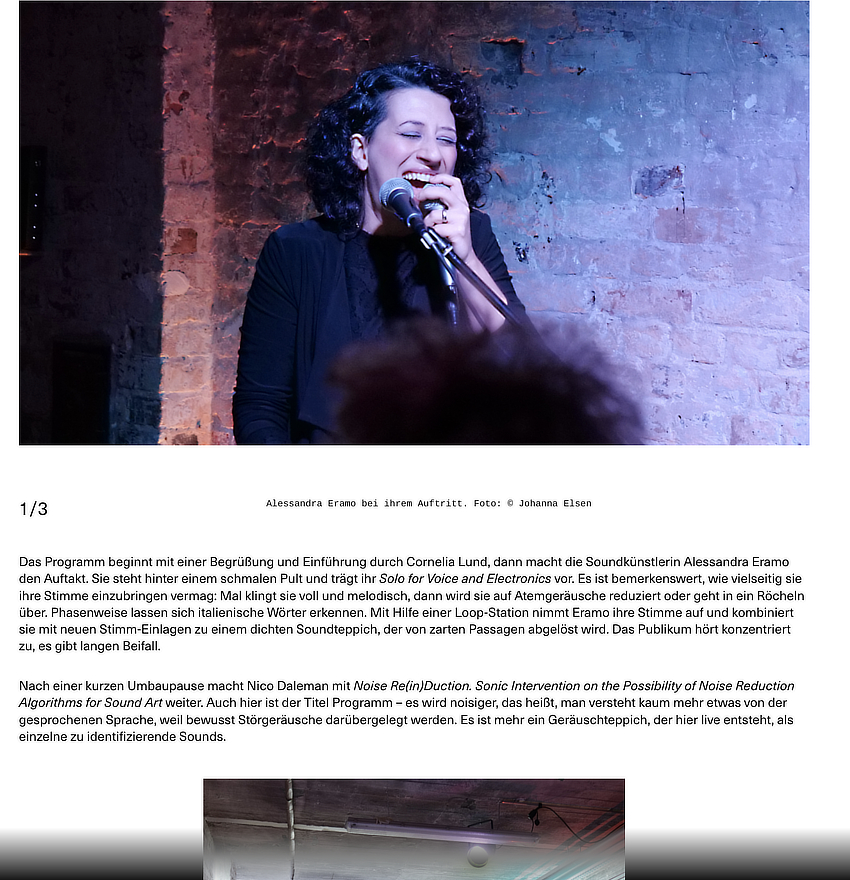
People's Government of the Directly Administered Municipality of Wuhan, April 2025
River Song, Alessandra Eramo - Workshop and Performance at Wuhan Art Museum and Qintai Concert Hall, Wuhan
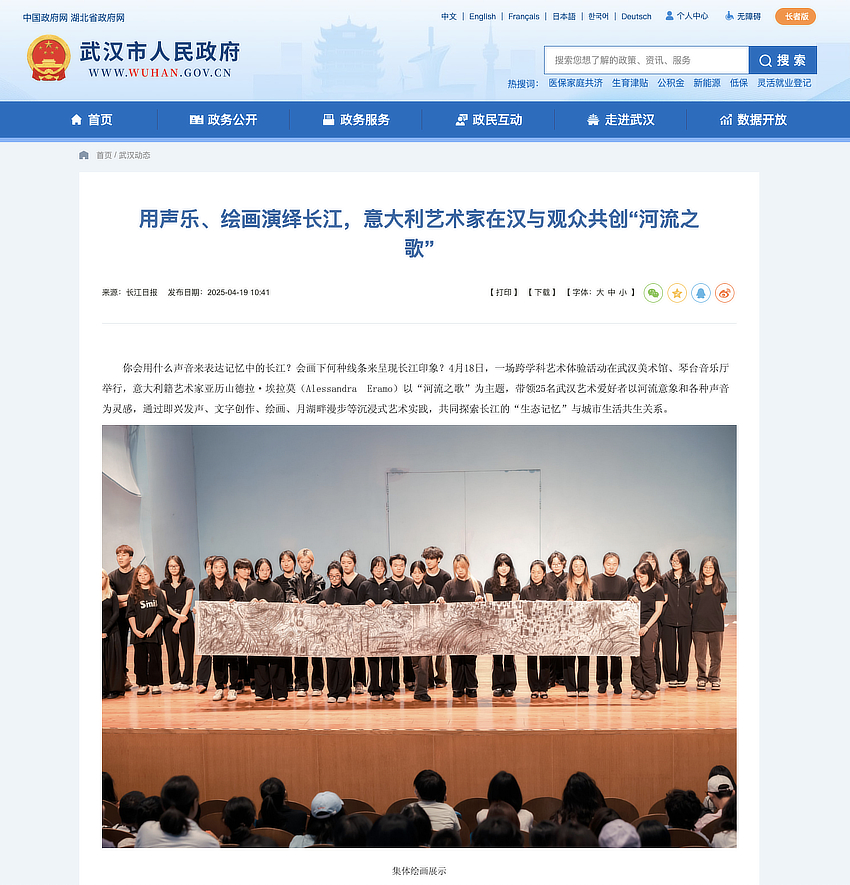
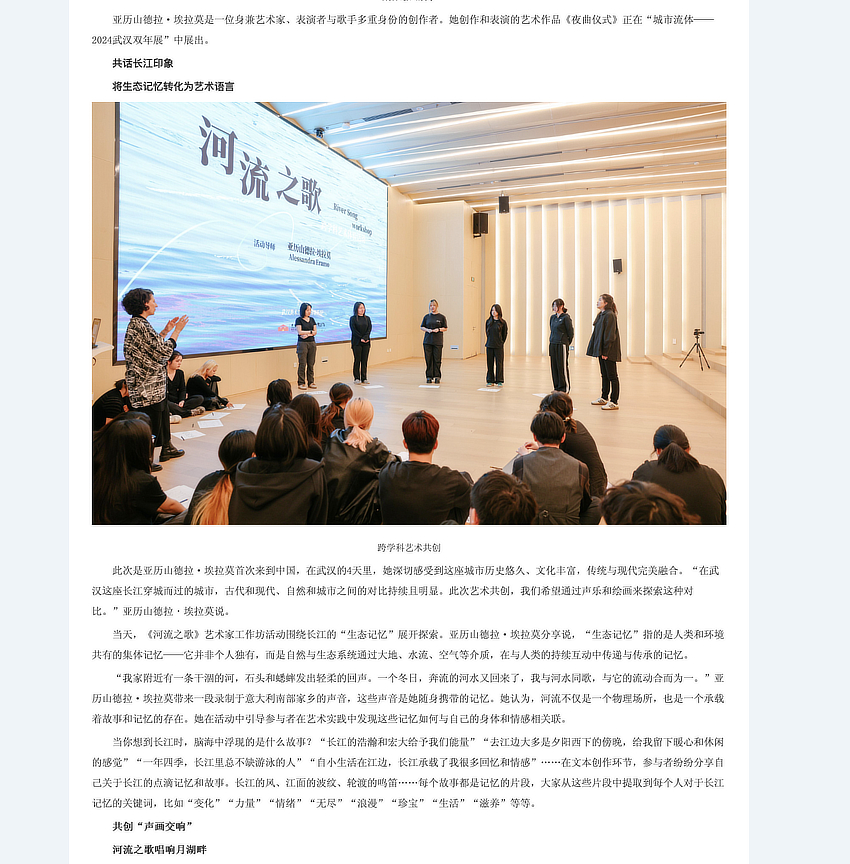
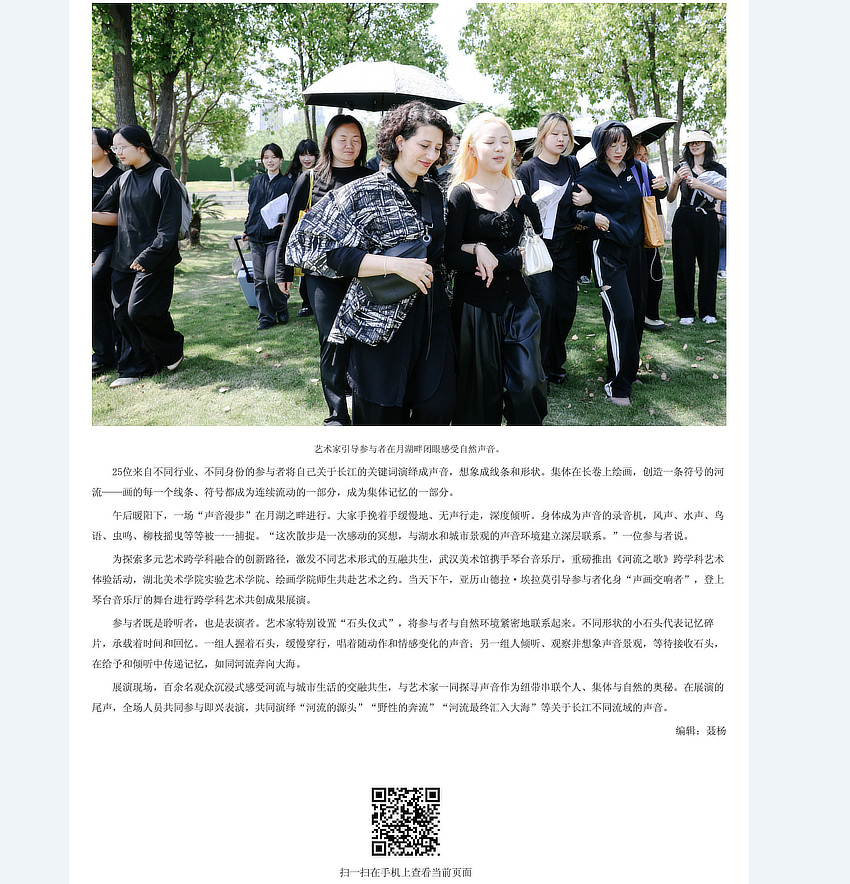
Discover Wuhan - April 2025 River Song, Alessandra Eramo
Workshop and Performance at Wuhan Art Museum and Qintai Concert Hall, Wuhan
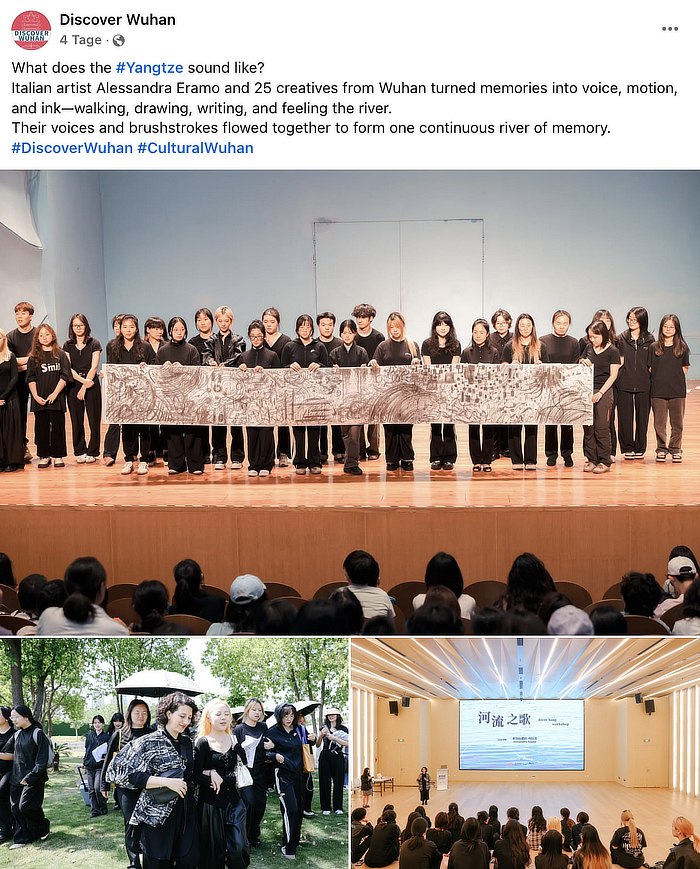
The Next Day, Berlin - February 2025 Sound Performance
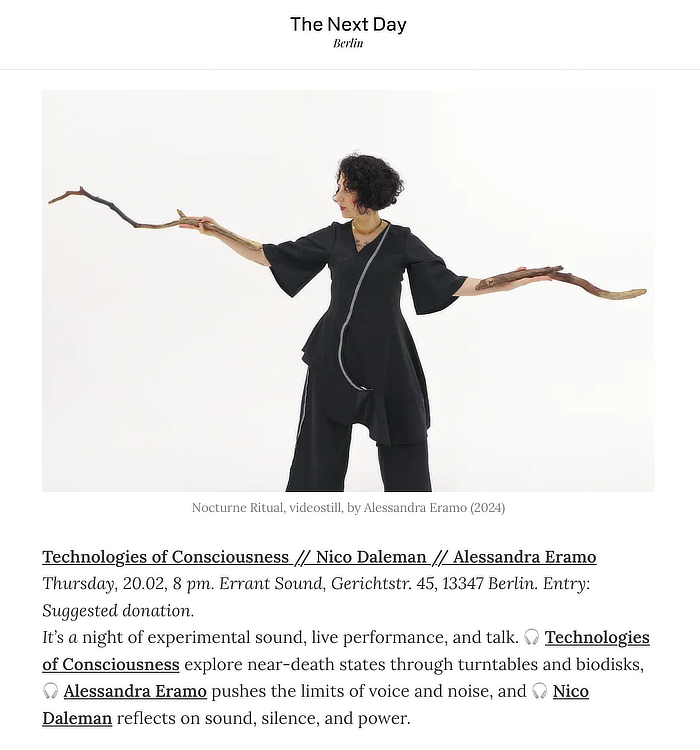
CTM Festival Berlin 2025 - Review on The New Noise, February 2025 Liederbuch der Apokalypsen - Choral Performance

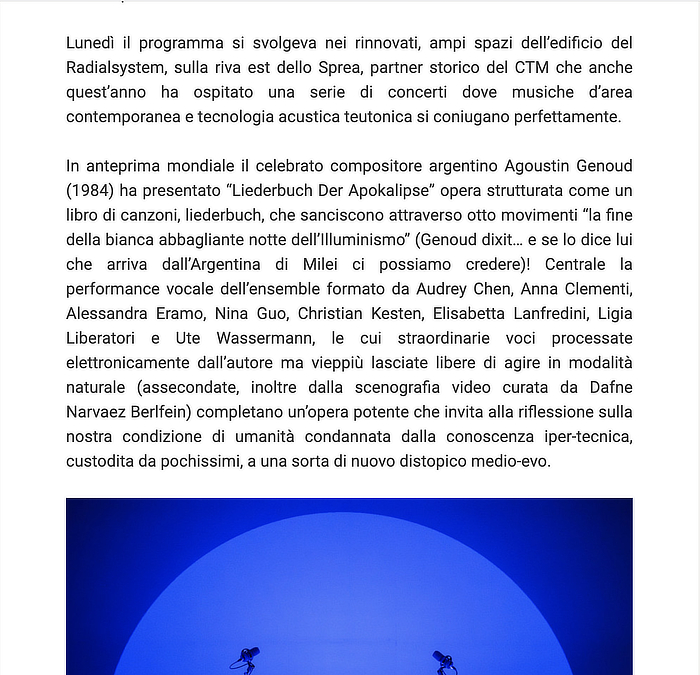
MaerzMusik Festival 2024 - Concert review on Music Paper, 1st April 2024 ATRAVÉS by Merche Blasco, with Alessandra Eramo, Ute Wassermann, Anna Clementi, Lorena Izquierdo a.o.

The Asocial Telepathic Ensemble - Review on Neural Magazine, 25th March 2024 double cassette released on Corvo Records


Group Exhibition "Mezz'Aria" Review on Artribune, 11 July 2023
"Soffio" - Installation at Museo del Novecento e del Contemporaneo di Palazzo Fabroni Pistoia - Curated by NUB Project Space and Gabriele Tosi

TAZ, 26 June 2023
Heroines of Sound Festival 2023 - Radialsystem Berlin

Interview on Spazio Concept, 5 February 2023
"La Santa Monica" sound performance - Interview curated by Diana Lola Posani

Concert Review on THE WIRE, October 2022 Solo Concert at Heroines of Sound Festival 2022, Radial System Berlin
"Later, vocalist Alessandra Eramo performs Zosha Di Castri's The Dream Feed, using extended vocals and electronic effects to convey the visceral power of motherhoos. Eramo stands in a cloud ofstage fog and delivers keening and growls: it's Lynchian"

Review about the installation work "Tanz Sediment" and "Ultrasanity" exhibition on Neues Deutschland, 8 January 2020
TANZEN MIT SPINNEN
"(...) Gegen den vom Biss der Wolfsspinne ausgelösten »Tarantismus« kennt man in der Tradition des süditalienischen Apuliens das Heilmittel des »Tarantella«-Volkstanzes. Das Gift wird durch ekstatische Tänze, die Patientinnen, häufig Tabak-Erntehelferinnen, bis zur Erschöpfung ausführen, aus dem Körper getrieben. Alessandra Eramo erzählt uns von dieser historischen Heilmethode in einer multimedialen Installation mit dem Titel »Tanz Sediment«. Im Tarantella-Takt tanzt die Künstlerin auf Video in der Tradition ihres Heimatlandes, umgeben von geschmierten und verdrehten Zeichnungen, die Spinnenkörper aufrufen und den Eindruck machen, als wären sie während des Tanzes entstanden. An diesem Exempel wird auch der Tanz überhaupt als nicht-westliche rituelle Erfahrung lebendig."
Review on Revue et Corrigee, November 2019
Review on Kulturní Magazíne, October 2019
Interview on Toneschift, 24 May 2019
Review on Groove Magazine, May 2019
Article on Tageszeitung - Berlin Kultur, 27 April 2019
BBC - Radio3, Late Junction, 21 May 2019
Article on African Paper, 20 April 2019
Review on Diskoryxeion, 11 May 2019
Review on Chain D.L.K., 26 April 2019
Review on Music Map, 29 April 2019
Review on Blow Up Magazine, June 2019

Review on His Voice, 27 May 2019
Review on Sands Zine, 24 August 2019
Review on Digicult. Liminaria Artistic Residency for Manifesta12 Palermo, 28 November 2018
Interview on Digital in Berlin, 16th January 2018
Interview for "Masters (at) Work" Picktune Radio (DE)
1st April 2017, One hour of talk about my work, a lot of music, and some humming
"Roars Bangs Booms" on ResonanceFM
Wavelenght curated by William English, 10 June 2016Interview for Radio Cultura RUC Coimbra
27 April 2016Interview for "VOX MEDIA" (PT)
PhD Programm: Materialities of Literature, University of Coimbra, 9th February 2015, Tiago Schwäbl
Interview on Voci Globali (IT)
Musica e Web. Costruzioni di Relazioni e Ricerca di Sonoritá, 5th October 2015by Elena Paparelli
I territori lontani sono talvolta anche quelli più prossimi. E Rete significa anche rapporto reticolare fra arte e spazio urbano. A Realityvism 2015 Alessandra Eramo, artista sonora, cantante e compositrice, arriva con alle spalle un’interessante esperienza multimediale - nell’ambito di "Correnti seduttive" - che parte dal territorio di Taranto, la "Città dei due mari", capitale dell'industria siderurgica. La sua installazione sonora, "Se Dio Vuole", affronta il suo rapporto col Mar Piccolo di Taranto che, a causa dei veleni scaricati dall'industria e dalle vernici per ristrutturare le navi della marina militare, è stato derubato della sua antica tradizione e destinazione, la coltura dei frutti di mare. "In quest'opera - spiega - ho rivolto la mia attenzione ai suoni e agli oggetti trovati sul Mar Piccolo e alla musicalità del dialetto tarantino". Per farlo la Eramo ha adottato, come elemento visivo, A' Zoc', ovvero le corde di sparto che da oltre 2000 anni vengono utilizzate per l'allevamento dei mitili. "Nel groviglio di corde ho disposto quattro altoparlanti neri da cui proviene una composizione vocale basata sui suoni gutturali del dialetto tarantino e su parole in greco antico, la cui eredità linguistica è tuttora presente nel tarantino". A incantarla l'idea che, nonostante lo sforzo di molti filologi, il suono della lingua greca antica rimanga sconosciuta perché mai ascoltata. "Ho provato dunque a dare voce a quelle parole di dolore e di speranza. Ho esplorato una memoria sonora legata alle mie radici". Nella stanza sede dell"installazione, altri due altoparlanti diffondono un canto melodico che l'artista ha scritto e interpretato ispirandosi alle musiche della Settimana Santa tarantina. "Alla fine del canto, si avvia una registrazione originale del molo del Mar Piccolo che ho fatto alle 5 del mattino, in cui si ascolta il rumore assordante dell'industria che contrasta drammaticamente con il grido dei gabbiani".
Fra realtà e cultura digitale, la Eramo, abituata ad esplorare e intrecciare suggestioni apparentemente distanti nello spazio e nel tempo, non vede alcuna frattura. E confessa anche una certa curiosità per il fenomeno dei commenti a video di concerti o spettacoli teatrali: "Con i commenti si vengono a creare delle vere e proprie tribune spietate, tutti diventano giudici disinibiti e agguerriti, lo trovo veramente divertente, come fosse già la sceneggiatura di una performance dadaista". Più che dal loro contenuto, è attratta soprattutto dai suoni che possono avere le voci dei commentatori: "nella discrepanza tra il fenomeno orale e scritto che sembra essere letteralmente esplosa nelle piattaforme web - confessa - personalmente riesco a trovare molte ispirazioni".
Solo Performance: Video on URSSS (IT)
published October 2015about the Live Performance at FLUSSI Media Art and Electronic Music Festival, 27th August 2015
Alessandra Eramo è un'artista che ti entra dentro e difficilmente ne esce. Il live al vespro, nella suggestiva atmosfera del giardino della Casina del Principe, si concretizza in una performance emozionante tra vocalismi e tecniche canore, singulti e suoni vocali spezzati, a tratti simili a ninne nanne a tratti ad evocazioni e linguaggi sconosciuti provenienti dalla sua parte più profonda. Non possiamo escludere che la sua evidente gravidanza renda al pubblico l’esibizione ancora più intensa, viscerale ed empatica.
about the Live Performance at FLUSSI Media Art and Electronic Music Festival, 27th August 2015
"Alle otto circa, quando il sole si fa sotto, pronto al tramonto, si esibisce Alessandra Eramo. Bellissima la sua performance. Lavora con la voce, i suoi suoni sono qualcosa di diverso. Dalla sua voce si diparte forse la vita che ora porta dentro di sé (è incinta). Alterna ninne nanne a segnali di distruzione; una voce radio annuncia "Burn, destroy", ma la Eramo è più viva che mai"
Article/Review in Jazz Port (CZ)
R E V I E W S about "R O A R S B A N G S B O O M S"
7" released on Corvo Records
November 2014
"Fantastic work. (...) Sounds almost like a musique cconcrète collage made from Folkways LP about the removal of the larynx. But it's not!"
THE WIRE (UK) "Size Matters", Byron Coley, May 2015
"Eramo transforms her whole body into a means of expression, into a beat-boxing, tongue-clicking, screeching, slurping, hissing medium..."
Bad Alchemy (DE) Rigobert Dittmann, #85
This is infinitely preferable to allowing the work of Russolo and others to become fossilised as part of culture's history. (...) If you accept Russolo's polemic about the limitations of the orchestra and his speculations about how electronics could extend the range of available timbres, then Eramo arguably comes closer to embodying the real meaning of Russolo's work."
The Sound Projector (UK) Ed Pinsent, January 2016
"The artistic scope of the voice is to make it not just a communicative instrument, but also a framework within which psycho-aesthetic situations can develop. (...) Alessandra Eramo is a performer of sound poetry, moving in the best tradition of Fluxus artists (...) Listening, and here is an archaic prelinguistic situation, which over time expel the ... distant future - and these sounds help to capture an audio Babel. It is at least peculiar to listen to this artist, who manages with vigor and vision the main Italian artistic traditions of the 20th century, starting with the Futurists, through Giacinto Scelsi to touch then Demetrio Stratos and his descendants."
ΔΙΣΚΟΡΥΧΕΙΟΝ / VINYLMINE (EL) Phontas Troussas, February 2015
Read more Reviews here
R E V I E W S / F E A T U R E S about "C O R R E N T I S E D U T T I V E
"Correnti Seduttive" Sound Art Exhibition, Taranto (Italy) with Georg Klein, Steffi Weissman, Peter Cusack, Wendelin Büchler and Alessandra Eramo
3 March 2014, Sven Rech

4 March 2014, Silvia Naccarati
4 March 2014, Valentina Pellegrino
"The love for this city is represented in each single work. Every sound. Every photograph. Every breath is an indelible sign. Experiencing the sound of Taranto that the artists recorded here perhaps means to inspect ourselves, to challenge ourselves, and to ask ourselves 'why'. It will help us to recompose, to rediscover our balance, now that we lost it."
Silvia Naccarati, October 2013
Read more about "Correnti Seduttive" Project here
V I D E O P O R T R A I T
54th Venice Biennale - Padiglione Italia nel Mondo
curated by Italian Cultural Institute Stuttgart, 2011
15 Q U E S T I O N S t o A l e s s a n d r a E r a m o
Tobias Fischer, 23 May 2012
"For Alessandra Eramo, music is not so much a universal language crossing borders of culture, tradition and education. Rather, it represents the communication tool best suited to express universals - hidden truths, archetypes and, to put it in her own words, "archaic memories" shared through intuition, spirituality and the passing down of knowledge from one generation to the next. Sound, as seen from this angle, is a carrier, resonating with associations and references to things beyond the grasp of words or rational logic; the very phenomena, in short, capable of instilling a sense of belonging, community and meaning. While the conventions of marketing and PR suggest that the artist needs to make an effort of reaching out to his audience, the music of Eramo's artistic brainchild ezramo appears to do the exact opposite: Existing as an indestructible idea inside an inner space, it is patiently waiting for the listener to come to it in his own time. It seems quite apt, therefore, that Eramo should not have hosted her former concert series of explorative music with her husband, creative collaborator and corvo-records-label-partner Wendelin Büchler, in the big German metropolis of Stuttgart, bust just outside of it, in picturesque, medieval Ludwigsburg. Those living in the big city had to leave familiar territory behind and take the night bus to reach performances of "free jazz, intermedial poetry projects, video projections and electro-acoustic composition". The reason that the series turned out to be such a remarkable success, with visitor numbers regularly exceding those of similar events in Stuttgart, turned out lie precisely in its remoteness: Here, within a space far off from the safety net provided by the big city, artists were free to truly aim for the sense of revelation and discovery that comes with taking risks, free to open themselves up completely and stand naked in front of the public. Within this environment, the borders between active performance and its passive consumption were eliminated, the distance between performer and public wiped out. It is the same approach to the arts pursued by Eramo's debut as a solo artist, Como ho imparato a volare (How I learned to fly) on Corvo. Making use of the "sounds of larvae during their transformation into flies", field recordings "made during the rites of the Easter procession in the South Italian town Castellaneta (Taranto)" and intimate piano recordings, the album deals with the eternal questions of life - as Eramo simply puts it, "the nature of things" - in a way that speaks neither to the head nor the heart alone, but rather to an inbuilt compass, functioning like a passage into the sacred contained within ourselves. The experience is equally confounding, entrancing and reassuring, a softspoken ritual of cleansing as it were. Exact interpretations of the work may differ according to one's personal background, experience and education. But as long as one doesn't put it into words, it conveys a universal message which can be understood by anyone with an open sensibility."
Hi! How are you? Where are you?
Hi Tobias, I'm in Berlin and I'm doing really fine, thank you!
What is on your schedule right now?
This year reserved many challenges and surprises for me, and it seems that there are still some more coming up. Right now, I'm working on a new text-sound composition for voices and drawings. In July, I will be artist in residence at Harvestworks in New York City, where I will develop a multi-channel audiovisual installation for voices, faces and field recordings.
How would you describe and rate the music scene of the city you are currently living in?
Berlin is blooming and people from all over the world know this. It's an attractive city because it's still cheap to live. That's surely one of the main reasons why there are so many artists living here and it is making the city a very lively ground and so exciting. Berlin is also an experimentation field for a lot of people and this makes it very special. But this also leads to the situation that nothing is really established. And certain institutions sometimes don't seem serious. There is a variety of scenes in Berlin and I'm following them with great curiosity.
When did you start playing your instrument/composing, and what or who were your early passions or influences also in visual arts?
I started to sing and I wrote my first poem when I was nine years old. When I was fourteen, I was singing and doing concerts with my first blues band and earned my first money with it in Taranto, Italy. Then, during high school, I also started to practise noise music and experimental theatre, and was playing electric bass, oh yes! During this whole period, I was training in classical singing, while I was also very attracted to the study of art history. Then I went to Milan and took piano lessons. I studied Visual Art and Performing Arts in Milan, Stuttgart and Venice. So, since the beginning, I have never seen any fracture between visual art, performing arts and music. Also now, I feel completely free to work in intermedial forms.
What do you personally consider to be the incisive moments in your artistic work and/or career?
Two true loves: The first one in my early twenties, when I studied and discovered the Fluxus movement. I understood that I was not alone working in a multimedia field! Many musicians were in this movement and the other way round, a lot of visual artists were - and some are still are - making music. The second impact occurred two years later, when I discovered the work of Meredith Monk, which also helped me to understand and develop the study of my own voice. As I mentioned before, I got solid skills in visual arts, from where I developed a strong interest in Performance Art, with sound as a basic 'matter', followed by an intense study of the human voice as a genuine and immediate form of expression. So, during the last years, I've been confronting studies and musical practices connected to improvisation and new compositional forms. In all this, the word - poetry - has always been of great significance in these practices, and became a real vade-mecum between the arts.
The role of the composer has always been subject to change. What's your view on the (e.g. political/social/creative) tasks of composers today and how do you try to meet these goals in your work?
I have the impression that my generation is not interested in making politics. I don't really agree with this, but I do understand this point of view. Compared with other generations, it seems that we have less to complain about. I observe that in music scenes, today, there is a big interest in musical language itself but not in what the world around us is like or will be like and how the artist can influence it. Like I said before, Fluxus was a big influence for me and in these times, artists were much more into shaping the world. Today I observe that all the forms of expressions around us seems like they are loosing the sense of 'sensibility'. Today those forms of expressions tend to create an 'effect', to stimulate just a crude 'sensorial aspect' for the audience. The result is very degrading. What I am trying to do is to create something that lets people think, and feel, not on a 'sensorial-level', but on a 'sensibility-level'. This is for me already a political point. And I'm not doing it for my ego, I am not doing it to make people feel comfortable or to entertain them. I believe that artists have a huge social responsibility and, as everybody knows, the intellectuals, the artists are always the first to be exiled. Furthermore, I think reflecting about the state of society and making art are two sides of the same coin. Every time I leave my house, every time I walk on the streets or take the bus, for me creating art has already started. All that I hear, see and feel becomes part of my artistic work. My studio serves just for focusing and for putting the ink on the white canvas, but actually the canvas is always around me. So in that sense, I feel very connected with politics. In other, simpler words, I believe that art and life are one.
What do you usually start with when composing?
Beautiful questions! I love to define my working process as a putting together of what is already there. There's always something magical in it, and I enjoy seeing the intelligence that lives in the things around us a lot. An example: most of my instruments - although not all - found their way to me. My actual piano, for example, came to me when my husband's grandma died. I have a lot of instruments that are found objects or presents from people and I use them in my compositions and performances. Things come to me, this is how I start or how I don't start.
Cum ponere, the Latin means exactly this: to put together. That's what I do. I collect and I build something. In a broader sense, I collect experiences, sounds, impressions, visions, very often of a collective value. Then, at a certain point they emerge. And they succeed, they leave a sign.
How, do you feel, could contemporary compositions reach the attention of a wider audience?
I think when you reach one person deeply, in her or his soul, this is already a great success, because she/he will carry on this experience and she will surely share it with other people. And I love to imagine that it is like a sweet and sympathetic virus, which slowly expands and multiplies itself through the world!
Many artists dream of a 'magnum opus'. Do you have a vision of what yours would sound like?
Oh yes! Sure. My idea is to realize a multimedia work with voice in a big choir, to involve performers with different ages and with different social backgrounds.
What are currently your main artistic challenges?
In my current artistic works, from vocal live-performances and so-called relational performances to various text-sound compositions, I am focused on the phenomenon of the 'voice': voice vs. body, voice vs. singing, voice vs. verbal and non-verbal language. In particular, in the relationship between its oral and written appearance. Therefore the relationship between voice and sign. And I am convinced that, in this whole process, there is always something hidden ... I'll give you an example to explain what I mean for 'something hidden': In 2006, I attended a conference of the butoh dancer Tadashi Endo at the University of Venice. I was very impressed by his statement: 'I will never be able to see the back of my body. I am interested in exploring the shadows, the unknown parts of my body'. That's simply true: there are a lot of unexplored parts of ourselves, as well as of our body, which at the end is all that we have. If I sing, I am particularly interested in what is singing in the voice ... So, imagine how many things around us remain unexplored.
How do you see the relationship between sound, space and performance?
Let's take an example, which is very close to a topic of my artistic research: If you're listening to a field recording piece, it includes an important performative aspect: The making of, the moment when the artist realised the field recordings. These two things, the experience of recording and the space, where the recordings were made become the main aspects of the piece. What we hear afterwards is the result of a process. And this process is the main part of the piece.
What do improvisation and composition mean to you and what, to you, are their respective merits?
I can just say from my own experience in improvised music, that as soon as I wake up, I have to improvise, as I can only to a certain degree say what is going to happen the next second. People who say 'I don't improvise' are probably people who don't enjoy the surprise of every second of their life. Johann Sebastian Bach improvised most of the time, remembered what he had found (amazing!!) and wrote it down as a world-famous composition. So both of them have their merits, where the concept of memory is just developed in different forms.
Derek Bailey defined improvising as the search for material which is endlessly transformable. Regardless of whether or not you agree with his perspective, what kind of materials have turned to be particularly transformable and stimulating for you?
I work - basically - with voice, field recordings and text, which I consider languages that can talk to us, languages, to be explored. For me, they can't be defined as material, or tools. The so called material for my works is always the relationship between the things. The material for my work is often the relationship between a field recording and the listener, or between a vocal performance and the audience. Obviously both need each other to exist. We need silence to listen to noise, only inside this relationship are we able to understand (and to realize) what noise and silence are. It is exactly in such relationships in which I find the material for my works.
Some people see recording improvised music as a problem. Do you?
Absolutely not. Improvisation should be recorded and I would call the result a 'documentation' of an action. Like a documentation of a unique performance art piece. You know, even in composed music, you will never have the same effect, as the framework is always different. I hope recording will go on, it has a documentational value. What's wrong with it?
Please recommend two artists to our readers which you feel deserve their attention.
Oh! It's too difficult to recommend 'only' two artists. Well, I'll try: Composers Pauline Oliveros and Domenico Sciajno
R E V I E W S about "C O M E H O I M P A R A T O A V O L A R E"
"COME HO IMPARATO A VOLARE" LP released on Corvo Records
April 2011

This is evocative, lyrical art, created by a very gifted miniaturist. (...) one of the most beautiful records (aurally and visually) I have received this year.
The Sound Projector (UK) Ed Pinsent, December 2012
"The illegitimate child of the early Moondog. Her music is as unorthodox as snotty piece of art."
Skug Magazine Curt Cuisine, February 2013
She embodies a noisy experimentation, in a crude art without concessions.
Revue & Corrigée (FR) Cyrille Lanoë, January 2012
"Learning to fly. Check In. Resurrection is flying away, coming home. Learning to fly is to reunite with the memory - of sweet nothing? What is the aim of Philosophy? To show the fly the way out of the fly-bottle (Wittgenstein, Philosophische Untersuchungen, §309)"
Bad Alchemy (DE) Rigobert Dittmann, #69
"The solo album of Italian singer Ezramo pushes the boundary even further towards insanity"
MIRT (PL) M/I, May 2011Read more reviews here



























